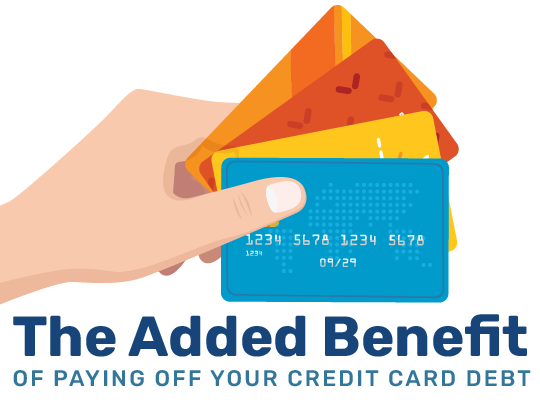The relationship between your credit card balance and your credit score
 by: holli casto
by: holli casto
vp of training and development
Published 9/19/2024
As credit card balances have reached record breaking highs over the last year, one goal many Americans have made has been to pay down their debt.1 Aside from freeing up room in your budget, paying off credit card debt has another added benefit: it will usually help you raise your credit score.
Your credit score is part of the foundation of your financial well-being. Working on having a high credit score is a goal that we can all work on throughout our lives. The balance on your credit card has a close relationship with your credit card balance at the end of your billing cycle.

Credit card balances in the United States
Credit card balances hit a new all-time nationwide high of $1.14 trillion at the end of June 2024. This is an 11% increase compared to June 2023.2
The last record for credit card balances was set in 2019, with a slight decrease in spending during the pandemic. Despite decreasing inflation, there have been marked increases in balances across multiple age groups in the last two years.2,3
How your credit card balance impacts your credit score
While it’s weighed differently by every credit bureau, your credit score takes into account how much you owe and how well you're managing your debt. This is also commonly referred to as credit utilization or credit capacity.
When it comes to credit cards, your score takes into account how much you owe in relation to your available credit. When your credit card balance uses more than 30% of your available credit, this is weighed more negatively on your score.4 For example, if you have $1,000 of available credit on your credit card and use more than $300, you would use more than 30% of your available credit. A low utilization rate shows lenders that you can responsibly manage the lines of credit you're given.
Statistically, people with the highest credit scores have utilization below 10%. Among people with a perfect FICO score of 850, their utilization was 4% or below.4,5
Why a high credit score is important
Your credit score follows you throughout your entire life. Building and maintaining a high credit score will help you when you need to apply for loans to purchase things like a home, car or RV.
Some employers and landlords also run credit checks as part of their applicant screening process. Also, if you hope to start a business and need a loan, one part of the due diligence for your loan application is checking your personal credit score.6
Ways to pay off your debt and lower your utilization
As you’ve heard us say countless times, paying off credit card debt is a fantastic goal. Credit card debt tends to have some of the highest interest rates in the nation, and it can feel very freeing to pay off.
When you pay down your credit card debt, we suggest keeping your credit cards and lines of credit open so that you still have available credit on your credit report. Keeping your credit lines open will show your credit utilization going down, which should help improve your credit score.
When paying off your debt, we recommend taking a strategic, targeted approach to your payments. Start by allocating any extra payments to one specific payment, and only pay the minimums on your other loans. Once that bill is paid off, take what you were putting toward that payment and put that amount toward the next bill you want to pay off in addition to its minimum payment.
Continue this process, progressively increasing the amount you’re paying toward a single bill until all of your debt is paid off.
Balance transfers and consolidation loans
Another common method of paying off credit card debt is to move all their balances to a lower-interest balance transfer credit card or consolidation loan.
This will increase the available credit on your credit cards, improving your credit utilization rate. Furthermore, the less interest you pay in the long run, the better.
There are two important things to take note of with consolidation loans:
- You need to keep your credit cards open
- You need to avoid building up a new balance on your cards
Unfortunately, a common mistake that is made with consolidation loans is people will close out the card that they paid off. This will damage your credit history and lower your credit utilization. Furthermore, some people have a hard time resisting spending on their card that has more available credit on it.
Taking out a consolidation loan or moving your credit card balances to a low rate balance transfer card is a good way to pay less interest and free up your capacity, but we advise you to do so with caution.
Why utilization can impact your score more quickly than your payment history
The two biggest contributors to your credit score are your credit history and your utilization. Improving your credit history is something that happens slowly as you make payments month over month. Lowering your credit utilization can help you improve your credit score while you create habits that help you build your credit history. Taking out a consolidation loan or moving your balances to a balance transfer card is a great time to re-evaluate your budget so that you can avoid overspending and build your emergency savings. If you need help with budgeting, check out our budgeting spreadsheets here.
Your utilization can change every month, impacting your credit score each time your credit card billing cycle comes around. If credit scores seem like a lot, and you want to learn more, we've made it easy to learn everything there is to know about credit scores with our Credit Score Workbook.
We know that credit card debt is a stressful burden to carry. According to a 2023 Nerdwallet Study, one-third of Americans with credit card debt say no one else knows how much debt they have.7 Making a plan and discussing your debt with a trusted friend or family member is a good step to take to feel less alone while you work your way out of your debt.
Furthermore, remembering the benefits of paying off your debt aren’t just financial, but relate to your credit score, your mental health, and your social well-being, serve as additional motivation to pay off your debt.
First Time Home Buyer's Guide
All the information to take in as a first time home buyer can be overwhelming to say the least. Our guide outlines the process for you.
4 Steps for Making Your Budget
This is for educational purposes only and not financial advice.
References:
1 Gailey, Alex. Edited by Rubloff, Tori. “Survey: Nearly two-thirds of Americans don’t expect their personal finances to improve in 2024.” Bankrate. 18 December 2023 https://www.bankrate.com/investing/financial-advisors/personal-finances-outlook-survey/. Accessed 18 September 2024.
2 Luthi, Ben. “The Latest Personal Finance News for September 2024.” Experian. 1 September 2024. https://www.experian.com/blogs/ask-experian/latest-personal-finance-news/. Accessed 18 September 2024.
3 Horymski, Chris. “Average Credit Card Debt by Age in 2024.” Experian. 2 July 2024. https://www.experian.com/blogs/ask-experian/research/credit-card-debt-by-age/. Accessed 18 September 2024.
4 Akin, Jim. “How Credit Cards Can Affect Your Credit Score.” Experian. 15 February 2024. https://www.experian.com/blogs/ask-experian/how-credit-cards-can-affect-your-credit-score/. Accessed 18 September 2024
5 Horymski, Chris. “How Many Americans Have a Perfect 850 Credit Score.” Experian. 20 May 2024. https://www.experian.com/blogs/ask-experian/perfect-scores-who-has-them-and-what-do-they-have-in-common/. Accessed 18 September 2024.
6 Waugh, Evelyn. “Why Is Credit Important?” Experian. 31 January 2022 https://www.experian.com/blogs/ask-experian/why-is-credit-important/. Accessed 18 September 2024.
7 El Issa, Erin. “2023 Consumer Credit Card Report.” Nerdwallet. 23 May 2023. https://www.nerdwallet.com/article/credit-cards/2023-consumer-credit-card-report. Accessed 18 September 2024.





